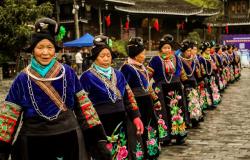
Recent scholarship on China at the United Nations (UN) considers whether there has been a discernible shift in power in China's favour. However, existing analyses predominantly focus on state actors and UN entities, whereas non-state actors, such as non-governmental organisations (NGOs), are largely neglected. This article examines the participation of Chinese NGOs in the UN, contributing to the analysis of China's evolving position in global politics. Through the contextualised examination of Chinese women's NGOs' engagement with the UN over the past three decades, the argument contends that there are different types of Chinese NGOs operating in hierarchical and shifting political settings. Despite the Chinese state's attempts to co-opt NGOs to strengthen its multilateral power base, it is oversimplified to perceive the engagement of Chinese NGOs at the UN as merely serving the interests of the state. Instead, Chinese NGOs play multifaceted roles that are shaped by their relationship with the state, as they deploy different strategies to navigate political space both at the UN and domestically. Although the Chinese government continues to dominate state-NGO relations, at the UN and elsewhere, there are a few instances where UN fora have provided Chinese NGOs with precarious but increased room for manoeuvre vis-à-vis the state.
Policy Implications
- In accordance with the UN Charter and ECOSOC resolutions, UN entities should continue to facilitate the meaningful engagement of NGOs from all parts of the world in multilateral processes.
- As a member state of the UN, China should encourage the diversity and autonomy of Chinese NGOs at the UN and remove barriers that could potentially have adverse effects on their participation.
- Chinese NGO strategies are useful reminders to UN stakeholders that China is not a unitary actor.
Photo by Lan Yao